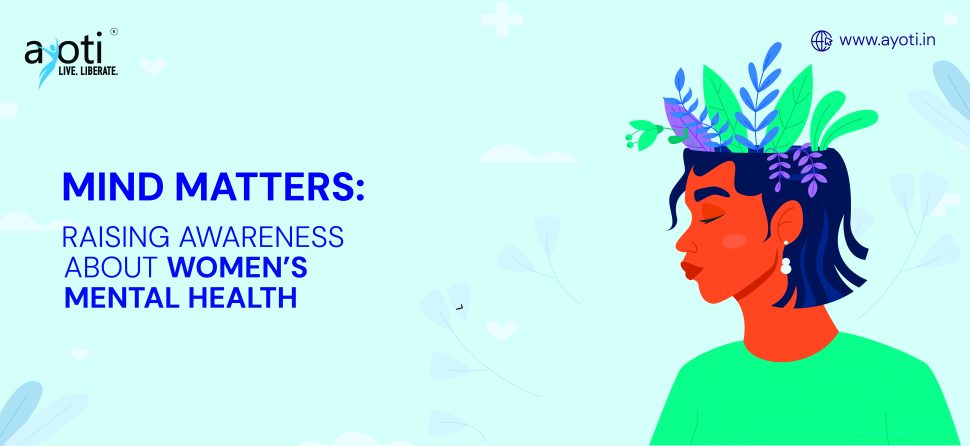By ayoti
Mind Matters: Raising Awareness About Women’s Mental Health
Women have been challenged more than men to stay sane due to hormonal changes and social roles during different life stages. Their personal lives greatly affect their emotional and mental well-being: menstrual cycles, pregnancy, postpartum changes, and menopause. Along with societal expectations, these factors cause tensions that ground unique psychological pressures that can greatly impact women’s mental health.
Women experience a higher rate of anxiety disorders, depression, and eating disorders. Other conditions, such as postpartum depression, are seen specifically in women. As stated by the World Health Organization, anxiety disorders and depression are markedly higher in women, almost twice as often as in men.
Challenges Women Face in Mental Health
- Stigma Against Mental Health: Despite the continued effort in various communities to keep the issues of mental health on the table, mental health is still a huge taboo in others. In many instances, women have the additional burden of filling in social roles as “the perfect mother,” “ideal partner,” or “successful professional.” Such big expectations weigh them down without introducing them, and hardly any woman feels like approaching a classy doctor or running around the other forms of help for fear of being judged or failing.
- Work-life imbalance: Many women are still juggling a delicate balance between their work, domestic life, and personal interests. This always leaves them stressed out to please and debilitates them with burnout, stress, and anxiety.
- Impact on Gender-Based Violence: Women have been subject to gender violence in the form of domestic violence or rape or harassment. Such experiences lead to severe mental disorders like PTSD and depression.
- Limited Access to Mental Health Resources: Mental health services in most areas of the global community remain a luxury rather than a necessity. Financial and geographical barriers strongly impede women from receiving the assistance they need.
- Cultural and Social Norms: In patriarchal societies, women’s voice is often cast aside. Culturally assigned male preference over women’s health leads to the invisibility of women’s mental health.
Importance of Raising Awareness
It is helpful for society to shed some light on the mental health of the female population in order to eliminate prejudices, encourage the discussion of issues and improve the probability of getting the necessary help. With the knowledge that mental health problems are common and treatable, women feel less isolated emboldening them to seek help.
Awareness campaigns also highlight how families, workplaces, and communities can support women through empathy and supportive action. A woman with an understanding spouse, supportive boss, and sympathetic friend might have a fighting chance with her mental health struggles.
Practical Measures for Promoting Women’s Mental Health
- Create a space for comfortable discussion: Establish places wherein women can freely and comfortably talk about their mental health issues without the fear of being judged. This addresses the problem of confession of admitting to mental health struggles.
- Promote self-care practices: Women tend to recall relationship concerns more than their own status. Therefore, encourage women to take care of themselves by eating right, practising some form of exercise, or spending more time on some interesting activity. I have shown these are ways of taking care of themselves.
- Improving access to mental health services: A leveraged partnership with Governments, NGOs, and communities is needed to provide affordable and accessible mental health care to women. A few ways to bridge the gaps in care are through telehealth provisions, community counselling centres, and helplines for assistance.
- Addressing work-related stress: The mental well-being of employees should become a recognizably observable concern, and employers should promote working conditions to achieve these goals through the introduction of policies such as flexible working hours, mental health days, and employee assistance programs.
- Combat Gender-Based Violence: The elimination of violence against women is critical to promote the well-being of their mental health. This involves enhancing legal frameworks, increasing awareness, and offering interventions such as crisis shelters and trauma counselling services.
Hope and Healing for Women
While the challenges are significant, there is hope. Women who receive timely and compassionate mental health care often make remarkable recoveries. Various methods such as therapy, support groups, medication, and certain lifestyle changes can transform lives. This will prove that mental health challenges are not a dead end but a new beginning.
Organizations worldwide are working tirelessly to prioritize women’s mental health. From grassroots campaigns to international initiatives, progress is being made. However, lasting change requires collective effort—from individuals to governments—to ensure that no woman suffers in silence.
Conclusion
It is not a matter of choice but rather a fundamental issue of real human rights, as women’s mental health does not relate to their individual affairs. Improving women’s mental health positively impacts families, communities, and workplaces. With more thoughtfulness and education directed towards these matters and advocating for funding, we ensure that the world values women’s mental health. We can work together to fight this stigma and support one another so that every woman can be happy and lead an emotionally and mentally balanced life. It’s high time that we realize that our brain health really does matter.





